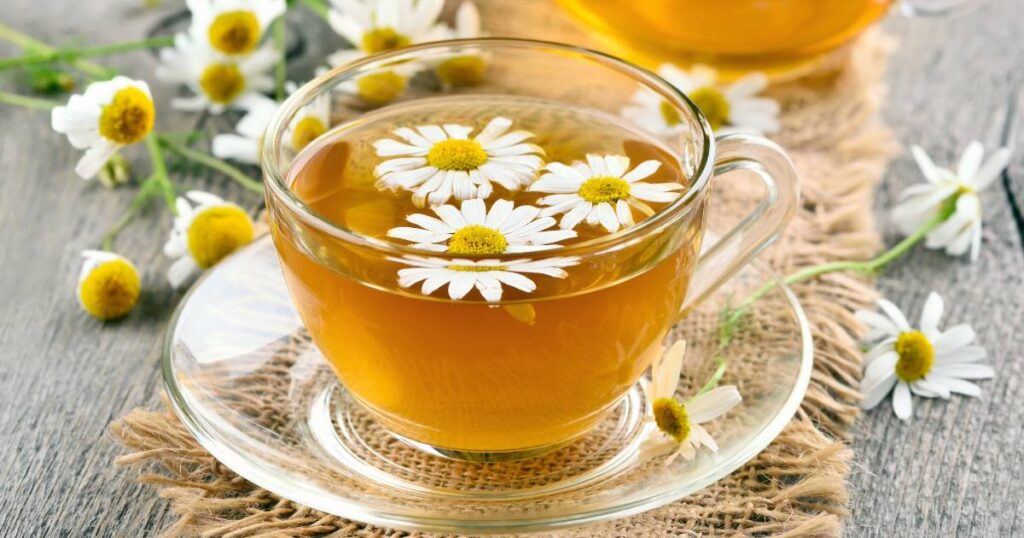
Among the herbal teas, chamomile tea is beloved for its soothing and relaxing properties. But many wonder – does regularly drinking chamomile tea stain and discolor your teeth? Let’s take an in-depth look at the link between this flavorful herbal tea and dental stains.
Chamomile Tea Overview
Chamomile tea is a herbal beverage made from dried chamomile flowers. There are two main types of chamomile used for tea: German chamomile and Roman chamomile.
Chamomile tea has been used for centuries as a natural remedy to:
- Promote sleep and relaxation
- Soothes anxiety and helps in reducing stress
- Alleviate stomach upset and nausea
- Reduce muscle spasms and inflammation
The floral, apple-like flavor and comforting aroma make chamomile a beloved tea choice. It can be enjoyed on its own or blended with other herbs, spices, and even black tea or green tea. A combination of chamomile-peppermint tea also works great to improve digestion.
Cause of Staining – Chamomile’s Pigments
At first glance, tannin free chamomile appears unlikely to have a role in staining teeth. The dried flowers and prepared tea have a pale yellow color.
However, chamomile does contain natural pigments that have the potential to stain teeth with regular long-term use.
Apigenin[1] is one of the main active compounds in chamomile responsible for both its health benefits and potential for discoloration. This pale yellow flavonoid antioxidant is found in high amounts in chamomile flowers.
Over time, apigenin may bind to tooth enamel and build up, causing a yellowish discoloration. This is especially true with exposure to heat during the tea brewing process, which concentrates the pigments.
Factors that Contribute to Staining
The extent to which drinking chamomile tea may stain your teeth depends on several factors:
- Brewing method – The hotter the temperature and longer the brew time, the more pigments are extracted into the tea. This increases staining risk.
- Quantity consumed – Drinking multiple cups of chamomile tea per day provides more pigment exposure versus occasional use.
- Tea format – Loose dried chamomile flowers release more pigment than pre-made tea bags.
- Dental hygiene – Proper brushing and flossing helps mitigate staining by removing pigment buildup.
- Susceptible teeth – Those with thinning enamel or dental work like veneers or bonding are more prone to discoloration.
Ways to Prevent Staining from Chamomile Tea
While chamomile tea may lightly stain teeth over time, there are preventive steps you can take:
- Limit consumption – Drink just 1-2 cups per day maximum to reduce pigment exposure.
- Avoid loose flowers – Use pre-made chamomile tea bags instead to minimize pigments.
- Brew with cooler water – Using water below 180°F helps preserve more pale pigments.
- Rinse mouth after drinking – Swish water to wash away staining compounds.
- Brush regularly – Careful brushing helps prevent buildup of yellowish pigment.
- Get dental cleanings – Professional cleanings remove stubborn stains.
- Avoid other staining foods/drinks – Limit coffee, tea, wine, berries if also drinking chamomile tea.
Natural Teeth Whitening Options
If you notice discoloration from chamomile tea, don’t panic. There are several natural ways to brighten your smile again:
- Baking soda – Make a paste with water and rub gently onto teeth. Rinse thoroughly.
- Hydrogen peroxide – Use as mouthwash (dilute with water first).
- Apple cider vinegar – Swish diluted ACV around teeth before rinsing.
- Coconut oil pull – Swish liquid coconut oil in mouth for 10-20 minutes then spit out.
- Lemon juice – Rub cut lemon over teeth, let sit briefly, then rinse.
- Strawberries – Mash to form an abrasive paste. Rub on teeth and rinse.
- Be patient, as it may take several weeks of consistency to lift deep-set stains using natural whiteners.
When to See a Dentist
For moderate to severe discoloration, make an appointment with your dentist. They can professionally clean and whiten your teeth for the best results.
In-office teeth whitening procedures are the gold standard for dramatically brightening a stained smile. These are overseen by a dentist and utilize higher-concentration bleaching gels than at-home kits.
While costly, professional whitening provides the most dramatic color transformation for stubborn tea stains.
The Bottom Line
Does chamomile tea stain teeth? With regular long-term consumption, chamomile’s natural pigments may cause mild yellowish discoloration in some people. Proper dental care and limiting intake can help prevent staining. For moderate discoloration, natural whiteners and professional whitening can safely restore your bright smile.
Don’t let fear of stains stop you from enjoying the multitude of benefits from chamomile tea, even for your dental health. Just be mindful of habits that reduce staining risk. With proper prevention and dental hygiene, you can drink chamomile tea without sacrificing your pearly white smile.

Lifebing is driven by an unrelenting passion for promoting health and well-being, our team is wholly committed to curating exceptional content and immersive experiences.
